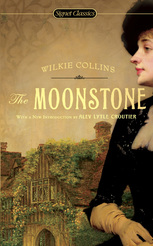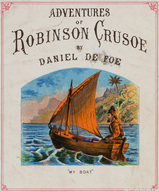 On my recent vacation, I finally got a chance to delve into a novel I've always wanted to read: THE MOONSTONE (1868) by Wilkie Collins, often considered the first modern detective novel. It also caused me to reflect a bit on my writing, and how important it is to consider the heart of each scene. The story is told through multiple narrators, including Gabriel Betteredge, the septegenarian steward of the household, charged with detailing the loss of the diamond--the mystery at the center of the novel. As a writer, I was immediately amused by the way that Betteredge set to writing his account. First, he consults his trusty ROBINSON CRUSOE, opening it at random as others might seek insights from a religious text:  "In the first part of ROBINSON CRUSOE, at page one hundred and twenty-nine, you will find it thus written: 'Now I saw, though too late, the Folly of beginning a Work before we count the Cost, and before we judge rightly of our own Strength to go through with it.'" A prophecy? he wonders. How could he set to writing such a momentous task? Could he see it through? Questions surely every author has pondered when staring at that first blank page before the story has begun. He then proceeds to speak at length at how well ROBINSON CRUSOE can answer all life's great mysteries. After a time though, he finally realizes he has not yet started the story he was tasked to write: "Still, this don't look much like starting the story of the Diamond--does it? I seem to be wandering off in search of Lord knows what, Lord knows where. We will take a new sheet of paper, if you please, and begin over again, with my best respects to you." So he begins his story again, this time how he came to serve in his lady's household, where the diamond was destined, and about how he came to marry his wife and have a daughter. Again he goes on at length, until he gets to the end of the passage: "My daughter Penelope has just looked over my shoulder to see what I have done so far. She remarks that it is beautifully written, and every word of it true. But she points to one objection. She says what I have done so far isn't in the least what I was wanted to do. I am asked to tell the story of the Diamond and, instead of that, I have been telling the story of my own self." Already off track, he then ponders further that idea that many authors probably think about: "I wonder whether the gentlemen who make a business and a living out of writing books, ever find their own selves getting in the way of their subjects, like me? If they do, I can feel for them." Then he starts the story one more time, this time with a little more desperation: "In the meantime, here is another false start, and more waste of good writing paper. What's to be done now? Nothing that I know of, except for you to keep your temper, and for me to begin it all over again for the third time." This may be surprising, but I think THE MOONSTONE offers an important lesson in finding the heart of a scene. In some ways, what the narrator Betteredge is doing is the kind of throat-clearing we often see writers do, particularly those with less experience. (To be clear, I am focusing on the words and thoughts of the character, not the actual author Wilkie Collins, who I think is brilliantly setting up the characters and the narrative). One of the things I've observed when critiquing the work of others--and this is certainly something I've struggled with myself--is how often writers (especially less experienced ones) do not start and end scenes in a particularly effective manner.
Many writers seem to just meander into a scene, as if they are strolling to an important event in town. Along the way to this event, they greet people, pop in and out of stores, talk on their cell phones, watch their dogs play, chase after kids, look at shapes in the clouds. Others meander away from an important event, without any plans on what they intend to do next. This may be fine in real life, but in writing, a scene should be more focused. I try to encourage writers to ask themselves questions: What is the goal of this scene? Does it advance a plot or subplot? Is it intended to reveal or continue a conflict? Is it meant to force a story forward? Is it intended to show a response to a conflict or dilemma? Does it indicate a decision or resolution (or even a seeming stalemate)? For me, even though I am a 'seat of the pants' kind of writer--a pantser--I find that asking these kinds of questions help me think through my intentions even as I go. This is not to say that scenes should follow some sort of template. One of the fascinating things about THE MOONSTONE is its unusual narrative structure (perhaps more common now, but certainly uncommon in its day). The scenes, though offered in a meandering way by the narrator, actually quite purposefully lay out the far-larger story of the diamond, dropping clues and intimations in a rather remarkable way. Getting to the heart of the story, by getting at the heart of each scene--is crucial. Otherwise, we'll be flailing about like Betteredge, "wandering off in search of Lord knows what, Lord knows where." And when your meandering tale can not be saved, pick up your quill, lay out a new sheet of paper and now, "refreshed in hope," re-start your story again.
2 Comments
|
Susanna CalkinsHistorian. Mystery writer. Researcher. Teacher. Occasional blogger. Categories
All
Archives
May 2023
|
 RSS Feed
RSS Feed